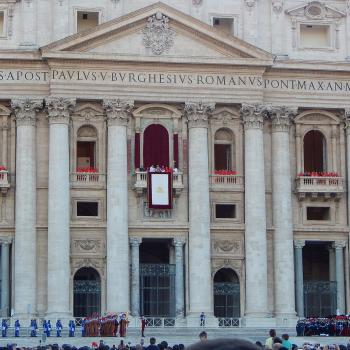This Lent I’ve been reading from On the Passion of Christ According to the Four Evangelists by Thomas à Kempis. I keep losing the book, so my progress is slow, and hence this thought for Good Friday from relatively early in the Passion:
The populace cried out: We have a law, and according to that law he must die because he has made himself Son of God. Upon hearing this, the governor became frightened and asked: Who are you?
The fear of God is one of the gifts of the Holy Spirit, and Pilate is showing a kind of fear of gods. Jesus isn’t being brought before him for some crime, and were he an ordinary lunatic, neither the crowd nor the Jewish leaders would bother with him.
The limits of Pilate’s fear are proven by the kinds of questions he asks.
He asks whether Jesus is a king. There is a dangerous sort of madman who uses exagerrated claims to build up a following and ascend to power.
Jesus says his kingdom is not of this world.
Who are you then? There is an even more dangerous possibility: Jesus might be one of the gods, now inserting himself into temporal affairs like the gods of old. If Christ has come to take sides in the rise and fall of kingdoms, Pilate will want to be on the right side — not merely out of grasping ambition, but because he knows he is no match for a god.
The trouble is that Jesus is not that kind of god. He’s here to take a side, but it’s the side of truth. What is truth? Pilate answers.
Pilate’s piety reaches its limits: He can believe in men who make themselves kings, and he can believe in gods who make men kings; but a kingdom outside this world is beyond his ken. If it isn’t of this world, it’s irrelevant — if it’s anything at all.
So Christ goes to His death. He comes to testify to the truth, and the truth is that men are in it for the bread.
Cover art courtesy of Ignatius Press. If you liked The Imitation of Christ, this one is your speed.












